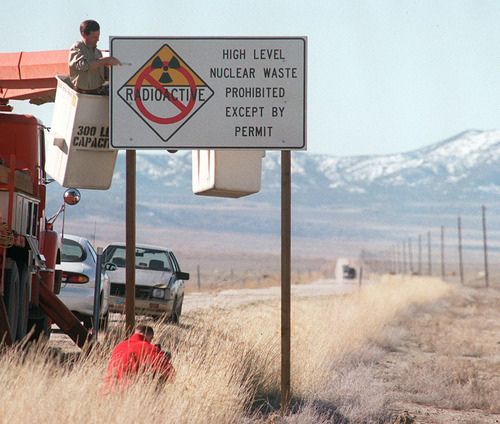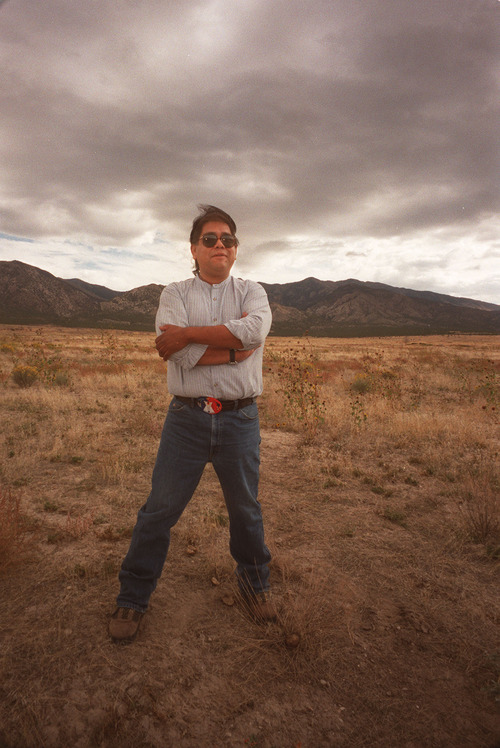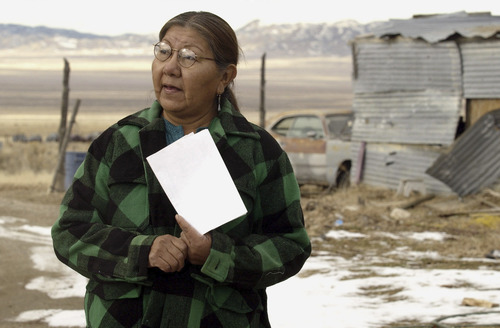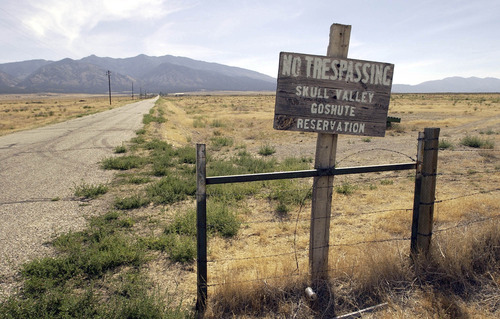This is an archived article that was published on sltrib.com in 2012, and information in the article may be outdated. It is provided only for personal research purposes and may not be reprinted.
Plans to store the nation's high-level reactor waste in Utah are officially dead.
The consortium of utility companies behind the idea has asked the U.S. Nuclear Regulatory Commission to scrap its license for a 100-acre parking lot for radioactive waste containers on the Skull Valley Goshute Reservation in Tooele County.
Private Fuel Storage "has notified us in writing it would like the license terminated," David McIntyre, an NRC spokesman, said Friday.
The request signals the end of a long, often bitter struggle that pitted the consortium and the Skull Valley Band of Goshutes against the Utah government and a majority of its citizens.
The idea gained momentum nationally as a solution for around 44,000 tons of high-level nuclear waste piled up at more than 100 U.S. reactor sites as the federal government failed to deliver on its promise to provide a permanent disposal site. The Goshutes were looking to the $3 billion project to solve economic development problems for the tiny, revenue-starved tribe.
Utahns of all political stripes and stations worked shoulder to shoulder to kill the project.
Sen. Orrin Hatch, one of the project's most energetic opponents, said Friday he is grateful PFS abandoned the plan once and for all and he credited the state's unified front against it.
"Storing this waste on the Goshute land so close to Utahns and the Utah Test and Training Range just didn't make sense," the Republican senator said, alluding to one of the state's strongest arguments against the site, which would have been a couple of miles from the area, about 45 miles from Salt Lake City, used for testing bombs and training fighter pilots.
Hatch and then-Sen. Bob Bennett attacked the plan by persuading some of the member companies to pull out of the consortium. They also voted to have the U.S. Energy Department proceed with the Yucca Mountain nuclear waste repository in Nevada so the waste wouldn't need temporary storage.
Attorneys for the tribe and its utility company partners did not respond Friday to phone calls seeking comment. Lee Bergen, the Albuquerque-based lawyer who represents the Skull Valley Band, said: "The tribe will issue a press release within the next few days."
Rep. Rob Bishop, R-Utah, sponsored successful legislation creating federally protected wilderness that blocked a rail spur needed to ship the waste from a rail line near Interstate 80 to the reservation.
Informed by a Tribune reporter Friday that the license was being dropped, Bishop called the news "an early Christmas present for the residents of Utah and the U.S. military."
"It was an ill-conceived location from the very start and [a] fatally flawed project from its inception," he said in a statement. "This wasn't a done deal until the termination of the license and I am pleased that we have been able to bring final resolution to a long-fought battle."
In 2006, a few months after the NRC approved the license, decisions by the U.S. Interior Department appeared to stop the project. The U.S. Bureau of Indian Affairs refused to sign off on the lease agreement between the Goshutes and PFS. And the U.S. Bureau of Land Management refused a right-of-way needed for offloading the waste and hauling it to the reservation.
An appeals court threw out the Interior Department rulings two years ago and gave the project a new chance at life.
Rep. Jim Matheson said he's been wary ever since. He noted that President Barack Obama's Blue Ribbon Commission on America's Nuclear Future recommended a year ago that an interim storage site should be built to consolidate the nation's waste while a permanent site is sought and built.
"There's only one place in America that's already licensed for that," the Utah Democrat noted. "As long as that [NRC] license was hanging out there, it was a concern to me." Gov. Gary Herbert in a statement Friday said, "I applaud this decision and remain committed to protecting the health and safety of the people of Utah."
Mary Allen, a former member of the tribe's executive committee noted that tribal members are circulating a petition to recall the current leaders and said she wasn't sure if the Goshutes are equipped now to deal with a project of this magnitude.
"I'm glad," she said of its demise. "We have concerns about our leadership."
Attorneys for the consortium notified the NRC on Dec. 13 that they would soon seek to have their license canceled, and they emailed the request Thursday, said McIntyre. The NRC office that issued the license, plus the agency's lawyers, still have to review and approve the termination.
"I would not expect any action until the new year," McIntyre said.
Twitter: @judyfutah









